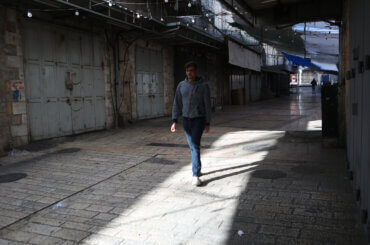
Joker, by Passetti at Flickr
Joker, the English dubstep musician, was scheduled to play Tel Aviv a week ago. Under pressure from boycott activists, he said he wasn’t going, and then said he was. Well in what is being described as a boycott victory, Joker apparently did not show up for his Tel Aviv gig after all, Alternative Information Center’s Uri Yaacobi Keller reports here:
Joker did not proclaim support for the BDS movement, but he also did not arrive in Israel. He apparently understood, unlike the Israeli clubbers who tried to fight the boycott with the “separation between politics and music” argument, that once the question of boycott was raised, a performance in Israel would become a deeply political act.
In the wake of the cancellation, the Israeli event organizers claimed that Joker had received threats on his and his girlfriend’s life. Since the Israeli organizers are the only source of this claim—Joker’s Twitter feed, the BDS campaign, and no news source hinted at this–it can be assumed that this is a lie intended to excuse the artist’s cancellation. The fact that someone – and an appreciated international artist at that – objectively chose to boycott Israel is apparently still a taboo that most Israelis cannot accept.



Horrified by the previous article on ” Joker” and the number of Mondoweiss comments who did not know who “Joker” was or the dance “dubstep”. I am an old age pensioner and I’m entitled not to know. Now get with it, you bunch of squares. On the topic of BDS Two reports from Zafrir Rinat and Aeyal Gross in Haaretz on 28 Dec 2011 give some details on how the Israeli high court arrived at its decision on Yesh Dins petition to it involving commander of the Israeli defence forces and others. See link to yesh-din.org
Here are a few of my own notes on the decision I have not seen the decision in full yet. The decision was perverse in the extreme. Under customary international law, the 1907 Hague regulations and the 1949 Geneva conventions, the military commander of the occupying authority must act within the occupied Palestinian territories(OPT) according to the narrow parameters of these laws which are:
1 Military needs and/or
2 To benefit the local protected population
Under article 55 of Hague, the commander or civil administrator is allowed to sell crops and minerals (using local labour) for the two reasons above.
The minerals in this case, quarrying material, under the rules of war may be mined (in this in my opinion the court made an error) in the same way and in the same proportion as was done before the occupation began(continuity). The problem for the court is that the quarries were opened after the occupation began, so the continuity which the court claimed should continue did not in fact exist. See paragraph 71, p19 of Yesh Din petition linked above.
Second, acting as trustee and administrator, the commander does not have the power to grant concessions or to transfer property rights and interest other than to ensure public order and safety in the OPT in breach of customary international law. See Hague regulation 43(the mini constitution of occupation). Obviously the sale of this material, 94% of which goes to Israel proper defeats the trust at the expense of the true beneficiary, the protected local population. The leasing of these property rights and interests, usually for 49 years with a further option also directly contradicts this trust, since occupation is supposed to be temporary. The usufructuary principle inherent in article 55 of Hague is breached in several other ways, the judge said mining did not affect the capital of the property – clearly this is not the case, the quarries have a finite existence and are not replaceable, as is for instance, fruit from a tree. As a non renewable public natural resource they are clearly Palestinian owned resources. WHAT IF THEY HAD BEEN DIAMONDS?
(1) An earlier decision in the Israeli high court which ruled that the Hague regulations prohibit
the exploitation of resources of occupied territory for the economic needs of the occupying country. “The military commander may not weigh national, economic, or social interests of his country in so far as they have no ramifications on his security interest in the area, or on the interest of the local population. Even military needs are his (i.e. the military commander’s) needs and not national security needs in the broad sense. Territory held in belligerent occupation is not an open field for economic or other kinds of exploitation” [HCJ 393/92 Teachers Housing Cooperative V Commander of IDF forces. Honourable justice A Barak 1983].
(2) The Israeli state attorney’s office relied on this principle in its response to the petition The Ma’ale Adumin Municipality filed to exempt it from paying for burying Palestinian waste in the Abu Dis waste-disposal site:
It is absolutely clear that the powers specified in Article 55 too are subject to the fundamental principal involving the powers of the military commander in territory that is subject to belligerent occupation, as appears from Article 43 (Hague 1907) whereby the area is not an open field for economic exploitation. Therefore the entire authority of the military commander in the region is exercised for security interests or for civilian needs of the population living in the territory, and this includes also the authority under Article 55.
(3) The issue of exploitation of natural resources of occupied territory arose following the occupation of Iraq by the forces of the USA and the UK, the two countries made a commitment to the UN security council that all the receipts from the Iraqi oil sector would be used for the Iraqi people, and would be kept in a separate fund from which only a recognised representative of the Iraqi people could draw (see UN resolution 1483 May 22nd 2003). The International court of justice at the Hague ruled that it was absolutely forbidden to utilise the natural resources of the occupied territory for the need of the occupying country and that by doing so breached article 43 (republic of Congo V Uganda. 19th December 2005).
The reasons advanced by the court in dismissing the petition are similar to the reasons the Israelis gave in drilling for oil in the Sinai peninsula, namely what was once desert was now a thriving industry (make the desert bloom) even the US government rejected that line of reasoning. Also in rejecting the petition judge Dorit Beinisch said the Isreal/Palestine interim agreement permits the quarries to operate in the present manner until a final status agreement is signed. This is also not correct, the PLO is legally prevented from entering into agreements with Israel that would undermine the interests of the Palestinian people under international law, even if such agreements were born out of mutual consent, because as a natural consequence of a state of belligerent occupation parties are not on an equal footing. This limits the ability of the authorities of the OPT to act freely without military pressure in the interests of the occupied population. The provisions set out in the Geneva convention prohibit the conclusion of agreements in which the imbalanced position of the two parties would coerce the authorities of the occupied territory to sign agreements hampering the rights of the occupied population.
Article 7(i) of the Geneva convention strictly prohibits the concluding of agreements that adversely affect the rights of protected persons and in all circumstances, customary international law trumps any administrative act by the occupier or any agreement entered into by representatives of the the occupied protected population. See http://www.alhaq.org/publications/publications-index/item/exploring-the-illegality-of-land-swap-agreements-under-occupation
Numerous UN resolutions, notably UN 465(1980) which the US did not veto, determined that Israel not change the physical character or demographic composition of the OPT are also instructive here, clearly Israel behaves above the law, and in a manner that thinks it owns the west bank, and all its resources. I can’t help thinking that judge Beinisch took some lessons from Tzipy Livni when the minister of justice said “I was minister of justice, I am a lawyer……but I am against law……international law in particular, law in general.”(the Palestinian papers). It is quite clear Palestinians seeking justice need not apply to the Israeli high court.
Music performance in Israel becomes a serious signal of accepting the occupation — once the BDS arguments are widely enough circulated. Thus, any refusal to “play” Israel is a double message: [1] that the BDS message is “out there” and [2] that the refusnik “buys it”. One hopes that it is “received” as both these messages inside Israel as well as everywhere outside, where each refusal ought to operate to get more attention to the whole BDS project and to the occupation and its illegalities.
Delegitimizing Israel? Only if bad behavior is intrinsic to Israel. Otherwise these messages merely ask Israel to shape up.
Sorry link to Yesh Din v Commander of Israeli defence forces and others, The Quarries case,you can find this link on my comment under BDS victory dated the 24th Dec 2011.
Another “game changer”, Joker does not play in Israel! It sure cancels out the BDS “success” of having Cornell and the Technion open a university in the heart of NY.
So, Phil, overall, how did BDS do this year?
Maybe Desmond Tutu or some other compassionate member of the human race reached out and impacted this young mans life.
Good decision.